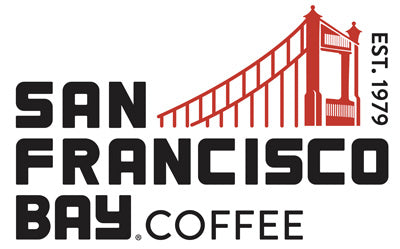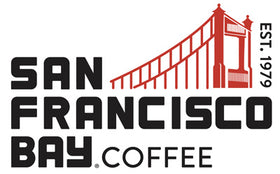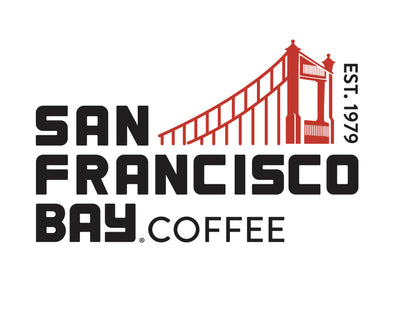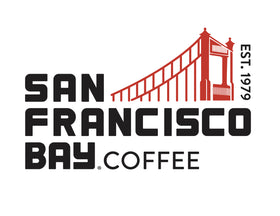Enveritas vs. Fair Trade Coffee

In ethical and sustainable coffee, terms like “Enveritas” or “responsibly sourced” and “Fair Trade” represent two different approaches to ensuring that your coffee is produced with respect for people and the planet. While both initiatives share the goal of promoting responsible coffee production, they operate under distinct principles and systems. This blog explores what Enveritas and Fair Trade coffee are, their benefits, and why at San Francisco Bay Coffee we believe choosing Enveritas responsibly sourced coffee could be a significant step toward a more sustainable future.
What is Enveritas?

Enveritas is a non-profit organization that provides a new model for verifying the sustainability and ethical practices of coffee production. Unlike traditional certifications, Enveritas focuses on a more inclusive approach by working directly with coffee farmers, regardless of their size and location. The goal of Enveritas is to assess and improve the social, environmental, and economic conditions of coffee farming communities worldwide, particularly those that are overlooked by conventional certification programs.
Enveritas uses advanced technology and data-driven methods to monitor and verify farming practices, assessing whether coffee is produced in a way that respects both people and the planet. Their holistic approach covers a wide range of sustainability issues, such as deforestation, water use, labor conditions, and more. Based on the results of that verification, we then invest in farmer support programs to tackle challenges faced by farmers in the areas where we source our coffee. By choosing coffee verified by Enveritas, you are supporting a system that aims to make sustainability accessible to all coffee farmers, not just those who can afford certification fees.
Benefits of Enveritas Coffee
The Enveritas model offers several key benefits that make it a compelling choice for ethically-minded consumers:
- Inclusivity: Enveritas works with all coffee farmers, regardless of size and location, so that even the most remote and underserved farming communities have access to sustainability practices.
- Data-Driven Verification: Using cutting-edge technology like satellite imagery and geospatial analysis, Enveritas provides accurate and reliable data on farming practices, allowing for real-time monitoring and continuous improvement.
- Comprehensive Coverage: Enveritas doesn’t just focus on one aspect of sustainability; it covers a broad range of issues, from environmental impact to social conditions, measuring whether coffee production is genuinely responsible.
- No Certification Fees: Unlike traditional certification programs, Enveritas does not charge farmers for verification, making it accessible to more producers and encouraging widespread adoption of sustainability practices.
What is Fair Trade?

Fair Trade is a well-known certification system that aims to ensure fair prices, decent working conditions, and environmental sustainability for coffee producers in developing countries. The certification is awarded to cooperatives and organizations that meet specific social, economic, and environmental standards in the coffee industry.
The core principle of Fair Trade is to provide a minimum price guarantee to farmers, protecting them from market fluctuations so they can earn a living wage. Fair Trade premiums are often invested in community development projects, such as healthcare, education, and infrastructure improvements, benefiting the communities where coffee is grown.
Benefits of Fair Trade Coffee
Fair Trade coffee offers several advantages that have made it a popular choice among consumers who prioritize ethical consumption:
- Fair Pricing: Fair Trade certification means that farmers receive a minimum price for their coffee which provides economic stability and helping to lift them out of poverty.
- Community Development: The Fair Trade premium is often reinvested in community projects, improving the quality of life for coffee-growing communities.
- Environmental Standards: Fair Trade certification includes requirements for sustainable farming practices, promoting environmental conservation, and reducing the impact of coffee production on the planet.
- Empowerment of Farmers: By supporting cooperatives and encouraging democratic decision-making, Fair Trade helps empower farmers and give them a stronger voice in the global market.
Why Choose Enveritas Responsibly Sourced Coffee

While Fair Trade has played a crucial role in promoting fair wages and community development, Enveritas offers a more adaptable and inclusive approach to sustainability. By choosing Enveritas' responsibly sourced coffee, you are supporting a system that reaches all farmers, regardless of their size, location, or resources. Inclusivity is key to Enveritas’ mission, as it encourages investments in continuous improvement through data-driven practices tailored to the unique challenges faced by coffee growers around the world.
Enveritas is particularly effective in addressing the diverse issues that impact coffee farming communities, from combating environmental degradation to cultivating social equity. Their approach ensures that sustainability is not just a certification but a comprehensive, ongoing commitment that works to genuinely benefit people and the environment.
If you want to enjoy your coffee and make a meaningful impact, choosing Enveritas-verified coffee is a powerful way to support a more ethical and sustainable coffee industry. Shop San Francisco Bay Coffee, where all our coffee is verified by Enveritas, and we will be a part of the global movement towards responsible coffee sourcing.



